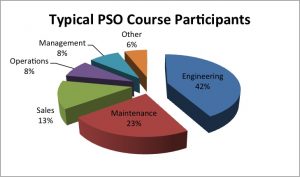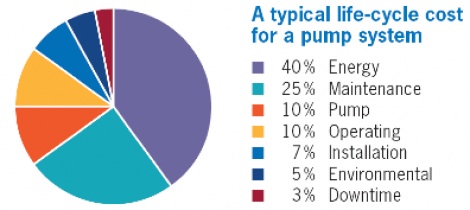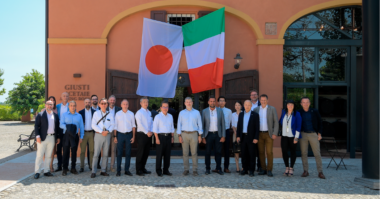When pump systems are not optimized for best efficiency, they drain corporate profits with higher energy and maintenance costs, decreased reliability and lower production line output. With pump systems running more efficiently, maintenance and operating costs decrease and the mean time between repairs increases.
When pump systems are not optimized for best efficiency, they drain corporate profits with higher energy and maintenance costs, decreased reliability and lower production line output. With pump systems running more efficiently, maintenance and operating costs decrease and the mean time between r epairs increases.
epairs increases.
A one day course, entitled “Pump Systems Optimization: Energy Efficiency and Bottom-Line Savings” (known as “PSO”) offers opportunities for participants to learn new skills to improve centrifugal pump systems efficiency. Those that attend the course also earn 7 PDH credits while developing skills to identify energy saving opportunities with pump systems. Most importantly, they learn how to develop an Action Plan including financial justification for pump systems efficiency projects. Implementation of these plans can result in short and long-term annual energy savings. In some cases, reasonably simple procedural changes can result in ongoing savings without capital expenditures. Pump systems improvement projects can result in 20%-40% energy savings annually. Energy, as a key component of total life cycle cost, is the single largest component of pumping operations, as illustrated by the chart above.
The course covers topics including: Why Efficient Pump Systems Are Important, Systems Optimization and Improvement Opportunities, Basic Pump System Interaction, Screening Pump Systems, Improving the Performance of Pump Systems, Life-Cycle Cost Analysis, Developing an Action Plan, ASME Pump Systems Energy Assessment Standard (available atwww.Pumps.org/ASME), and the new ISO 50001 standard for Energy Management Systems. The course was conceived by Pump Systems Matter (PSM), which is a 501(C) 3 non-profit subsidiary of the Hydraulic Institute (HI). Pump Systems Matter is helping companies, and energy efficiency organizations, save money by providing pertinent training on improving pump systems efficiency. More details can be found at www.PumpSystemsMatter.org/Training.
Courses are available anywhere in North America based on a “Hosting Model,” where hosts select a location and date of their choice. Included are all the necessary course materials and a highly-qualified instructor. Companies educate their plant managers, engineers, production and maintenance employees. Pump and related supplier OEMs (e.g. motors, VSDs) are also hosting the course to help educate their customers and distributors. Courses are also sponsored by electric power utilities, state energy offices, engineering consulting firms, energy service companies, other non-profit organizations – or any combination of interested parties. PSM can help introduce organizations that have an interest in jointly hosted courses. Typical course participant profiles are shown below.
Host organizations and course participants join together in advocacy for pump system efficiency optimization and energy conservation, working on key projects, while bringing a critical energy-saving perspective to the attention of an industry focused on change. Internal and external customers appreciate learning opportunities on this important subject and help their employer increase sustainable bottom-line savings.
Feedback from prior participants has been extremely positive. In 2010 Pump Systems Matter hosted seventeen well-received courses with nearly 500 participants. Nearly 90% of participants indicated that they would recommend this course, and learning experience, to others in their field. Significantly, 86% responded in post-course surveys that the content applied to their current job responsibilities and they would take action within their organization.
Pump Systems Matter is looking for energy savings leaders, who are advocates for opportunities to improve pump systems efficiency and produce bottom-line savings. Could you or your organization be the next Pump Systems Efficiency Leader or the next Pump Systems Optimization Hero? If interested in hosting a course, please give Kathy Doran, PSM Education and Training Coordinator a call today at (973) 267-9700 x216 or by e-mail at kdoran@Pumps.org.
For more information on this course and to access tools, guidebooks, standards, and other valuable educational opportunities, focused on pumps and pump systems energy, savings see: www.PumpSystemsMatter.org and:www.Pumps.org/FreeStuff.
HI is the largest association of pump producers and suppliers in North America and is a global authority on pumps and pumping systems. Its mission is to serve as a forum for the exchange of industry information, while providing value-added services to member companies and pump users worldwide. Nearly 100 companies belong to HI, and engineering consulting firms affiliate as “Standards Partners.” For more information about the Hydraulic Institute, its member companies and Standards Partners visit: www.Pumps.org. Pump Systems Matter is a non-profit 501(C) 3 subsidiary of HI, established to educate the marketplace and promote pump systems energy efficiency. For more information visit:www.PumpSystemsMatter.org.





Comments